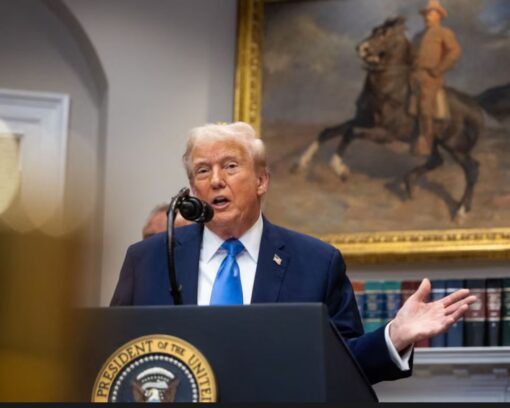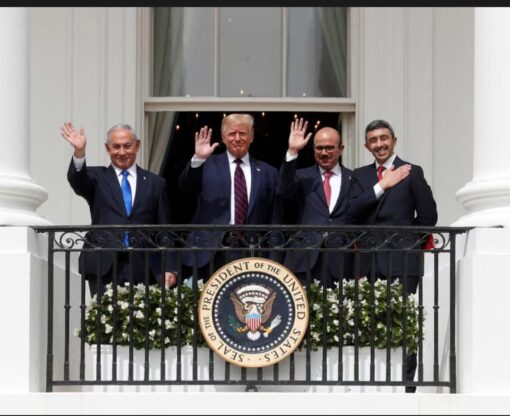British officials have expressed growing concern that President Donald Trump could move to officially recognise Israeli settlements in the West Bank, a step that could inflame tensions in the region and complicate ongoing diplomatic efforts.
The warnings come amid speculation that Trump may use renewed influence over Middle East policy to take steps that critics say would undermine long-standing international consensus and derail the prospects for a two-state solution.
“Such a recognition would be extremely destabilising,” one senior UK diplomat told reporters. “It would send the wrong signal to both sides and risk inflaming an already fragile situation.”
The issue has dominated conversations among European and Middle Eastern policymakers, who fear that any formal endorsement of settlements would embolden hardline positions in Israel and provoke strong reactions from Palestinian leaders.
British foreign officials have privately urged the United States to adhere to existing international frameworks and avoid measures that could exacerbate conflict.
“Trump has influence, and that influence comes with responsibility,” said a senior British official. “The recognition of settlements is not just a symbolic act—it carries real consequences on the ground.”
Analysts warn that settlements in the West Bank have long been a flashpoint in the Israel-Palestine conflict. While the international community largely regards them as illegal under international law, successive US administrations have varied in their approach.
Trump’s potential recognition would mark a stark shift, potentially encouraging expansion and further reducing the viability of a negotiated settlement. “Recognition would be seen as a green light for further settlement activity,” said a Middle East policy expert. “It could undo years of painstaking diplomacy and inflame regional tensions.”
Within Israel, reactions are expected to be mixed. Hardline political factions have long sought American endorsement of West Bank settlements, seeing it as legitimising their claims and cementing territorial control.

Meanwhile, more moderate voices warn that such a step could isolate Israel diplomatically and provoke wider unrest. Palestinian leaders, for their part, have denounced any potential US recognition as a betrayal of their rights and sovereignty.
“Our lands cannot be legitimised by political manoeuvres abroad,” one Palestinian official said. “Recognition of settlements would fuel anger and resistance across the region.”
The United Kingdom’s concerns reflect broader European unease over potential US moves in the Middle East. British officials fear that any settlement recognition by Trump could disrupt fragile peace initiatives and complicate ongoing efforts to reduce violence in Gaza and the West Bank.
“Europe has a stake in stability,” one diplomat said. “Trump’s actions could undermine years of cooperation and set back efforts to mediate a lasting solution.” The warning also signals the UK’s intent to actively lobby Washington to prevent unilateral measures that could destabilise the region.
Political analysts argue that Trump’s interest in West Bank settlements aligns with his broader foreign policy style, which emphasises bold gestures and symbolic acts designed to appeal to his political base.
“Trump sees himself as a dealmaker,” said a US foreign policy commentator. “Recognition of settlements fits that pattern, a dramatic action that will make headlines and energise supporters. Unfortunately, it risks creating more problems than it solves.”
Meanwhile, diplomats in Jerusalem and Ramallah are bracing for potential fallout. There are fears that public statements or policy moves could trigger protests and violence.
“Any hint of settlement recognition sends a message to people on both sides,” said a security analyst. “It could quickly escalate tensions in a highly volatile environment.”
British officials have emphasized that international law and long-standing agreements must guide US policy, warning that unilateral recognition would constitute a serious breach of diplomatic norms.
The speculation comes as Trump has reportedly held private discussions with Israeli leaders and key American allies in Europe about Middle East strategy. While no official announcement has been made, sources close to the former president suggest he is considering bold initiatives that would redefine US engagement with the region.
“Trump is weighing options,” said a political insider. “Recognition of settlements is on the table, and his advisors are weighing the consequences. Every move will be scrutinized globally.”
Public opinion in both the US and the UK is divided. Supporters of Trump argue that recognition of settlements reflects a pragmatic approach to long-standing disputes and strengthens US-Israel ties.
Critics, however, warn that it undermines peace efforts and international law. British media outlets have highlighted the potential consequences, with op-eds describing the recognition as “provocative” and “potentially catastrophic” for regional stability.
International organisations have also weighed in, with the United Nations reiterating that settlements in the West Bank are considered illegal under international law and that unilateral recognition could undermine negotiations.
“All parties must respect established international norms,” a UN spokesperson said. “The status of these territories cannot be decided unilaterally.” British officials have echoed this position, reinforcing their stance that Trump’s recognition could trigger serious diplomatic backlash.

For Palestinians on the ground, the mere suggestion of recognition has heightened anxiety. Communities in the West Bank have expressed fear that US endorsement could embolden settlement expansion and displacement.
“Our homes and lives are at stake,” said a resident of a West Bank village. “Recognition from abroad only encourages more occupation and makes the possibility of peace seem farther away.”
In Israel, while some political leaders have welcomed the prospect of recognition, others are cautious. Moderates warn that the move could alienate international partners and spark unrest.
“Yes, it’s politically significant, but it comes with huge risks,” said a former Israeli diplomat. “Recognition could inflame tensions and undermine our own security interests.”
British officials continue to press Washington for restraint, advocating dialogue and adherence to international law as the path to stability.
“We urge the United States to consider the broader consequences,” said a UK foreign office representative. “Trump may have the ability to act, but the impact on peace and security cannot be ignored.”
As speculation continues, the world watches closely. Trump’s potential decision on West Bank settlements has the capacity to reshape the Israel-Palestine conflict and test the resilience of international diplomacy. Analysts warn that the repercussions will be felt across the region, influencing politics, security, and the daily lives of civilians.
“The stakes are high,” a Middle East analyst concluded. “If Trump recognises Israeli settlements, it is not just a policy choice; it is a geopolitical statement with consequences that could reverberate for years.”
British officials are now urging allies to coordinate a measured response, seeking to prevent unilateral action from further destabilising an already tense region.


